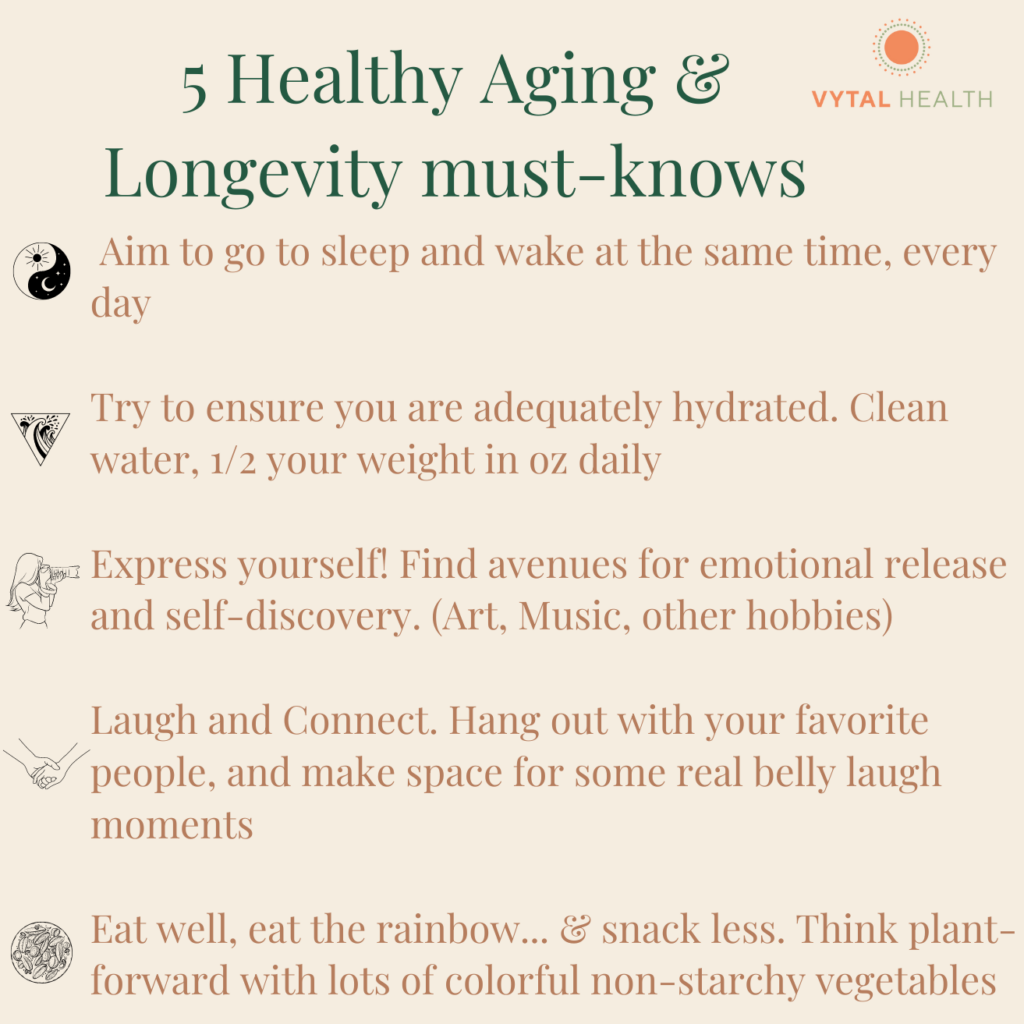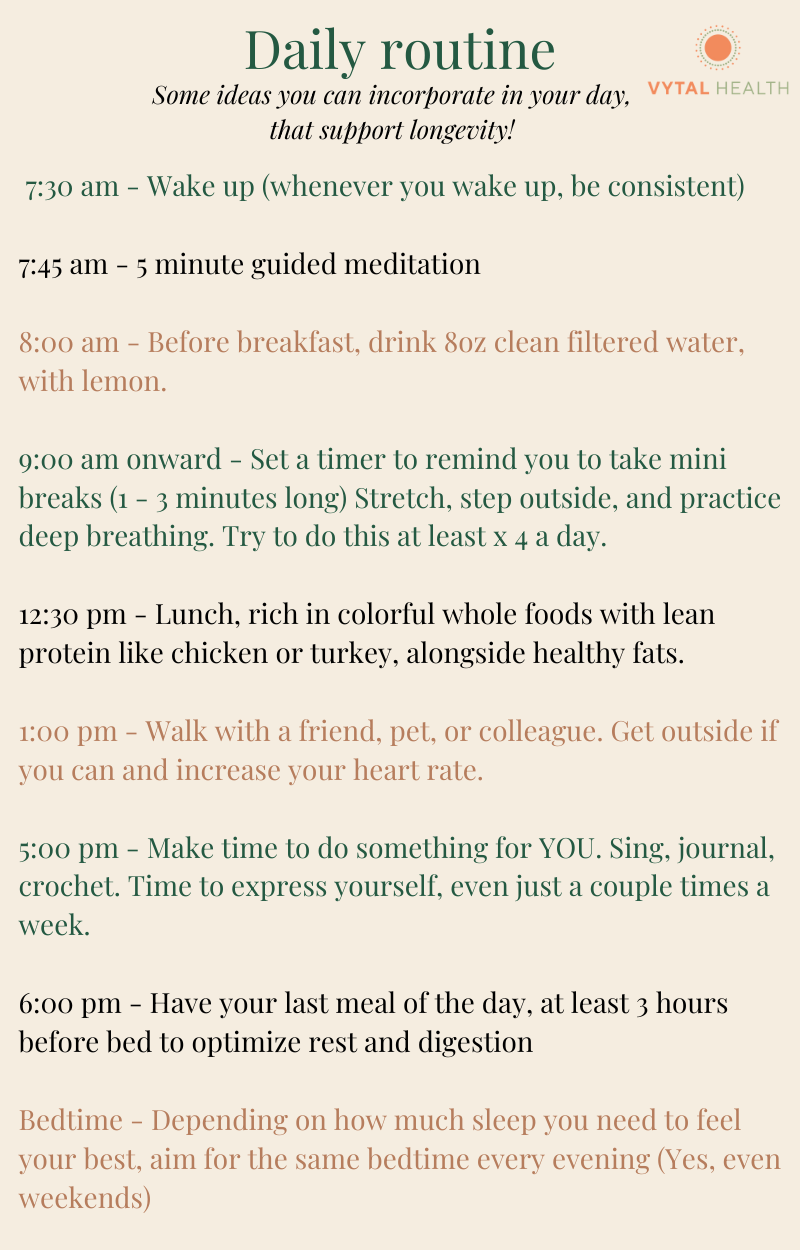Wisdom and Practices for aging with a strong, healthy body and mind.
In the realm of functional medicine, where holistic health takes center stage, the focus isn’t merely on halting the aging process but on fostering practices that pave the way for a vibrant and functional journey through the years. Drawing from a tapestry of wisdom and practices from our experienced functional medicine providers at Vytal Health, here’s our comprehensive guide for folks seeking to nurture longevity.

First things first!
Dr. Alicia McCubbins, ND reminds us that aging is a PRIVILEGE. She is not interested in stopping the aging process but is highly motivated to cultivate healthy practices for a smooth and functional evolution to older age. Rather than resisting it, we can embrace it as a natural progression, an opportunity to cultivate healthy habits that support our physical, mental, and emotional well-being. Read on for our provider’s essential habits for healthy aging.
Harnessing Hormone Regulation
Dr McCubbins also emphasizes that one key aspect of longevity lies in hormone regulation. Establishing a consistent sleep routine, where you go to bed and rise at the same time daily, can work wonders in regulating cortisol levels. This, in turn, influences crucial reproductive hormones like DHEA, estrogen, progesterone, and testosterone, essential for mitigating symptoms associated with physical and cognitive decline.
Hydration, hydration, hydration
Hydration stands as a firm pillar of longevity. Functional nutritionist, Cindi Lockhart says “Try to aim for half of your body weight in oz’s, of filtered water daily.” Beyond merely drinking clean, filtered water, ensure adequate electrolyte intake to facilitate optimal absorption, supporting cellular function and overall vitality.
The Therapeutic Power of Expression
Emotional well-being holds profound significance in the quest for longevity. Engaging in therapy, journaling, or expressing oneself through music and art provides avenues for emotional release and self-discovery. Deep breathing exercises and singing not only nurture emotional well-being but also stimulate the vagus nerve, promoting autonomic nervous system balance. Dr. Irene Carr, MD recommends parasympathetic nervous system breaks throughout the day. That might be breath work for 1-3 minutes, walks in nature, anything that calms and refreshes the nervous system.
Laughter and Connection
Incorporating laughter into our daily lives isn’t just a luxury; it’s a necessity. Whether through spending time with funny friends or indulging in stand-up comedy, laughter uplifts the spirit and enhances overall well-being. Moreover, fostering connections, whether through caring for others or spending time in nature, cultivates a sense of purpose and belonging, vital for a fulfilling life. Functional health coach, Patty Stark says “You’ve probably seen the statistic about adults laughing less than ten times a day and children laughing more than 300 times daily! Whatever the real numbers are, we don’t laugh enough. My Mama said, “If I don’t laugh about life’s setbacks, I’ll just sit on the curb and cry and that’s no good!” Connecting with friends and other loved ones is a wonderful way to foster connection AND hopefully have a good laugh, too.
Eating right, less snacking and more colorful whole foods
Dr Irene Carr, MD advises that if you can, adopting a lifestyle that eschews alcohol and excessive snacking not only stabilizes blood sugar levels but also supports metabolic health and weight management.
She also suggests embracing the practice of finishing meals earlier in the day, ideally three hours before bedtime, allows the body ample time to digest and metabolize food, promoting restful sleep and optimal digestion. When it comes to the final meal of the day, opting for light, nutrient-dense options such as broths, cooked vegetables, and modest portions of lean protein like chicken or turkey, alongside healthy fats, ensures that digestion remains gentle and conducive to a night of rejuvenating rest.
Our functional nutritionist, Cindi Lockhart recommends a plant-forward diet, abundant in colorful non-starchy vegetables, providing a rich array of vitamins, minerals, and antioxidants crucial for cellular health and vitality. Complementing dietary practices with intermittent fasting further enhances cellular rejuvenation, activating autophagy to clear out old and damaged cells, promoting cellular renewal and resilience. Additionally, incorporating practices like yoga and stretching counteracts the natural tightening of muscles and joints that accompanies aging, fostering flexibility, balance, and overall well-being throughout the years.
Movement
As we navigate the journey of aging, prioritizing regular movement becomes essential to counteract the natural decline in muscle mass and flexibility. Incorporating activities like yoga and stretching into daily routines not only promotes flexibility and joint mobility but also enhances balance and coordination, reducing the risk of falls and injury.
Engaging in strength training exercises preserves muscle mass and bone density, fostering functional independence and resilience as we age. Whether through brisk walks in nature, gentle yoga sessions, or structured strength training workouts, movement serves as a cornerstone of longevity, empowering individuals to thrive physically, mentally, and emotionally throughout the lifespan.
Age with grace and strength
In essence, nurturing longevity isn’t a one-size-fits-all endeavor but rather a holistic journey encompassing physical, mental, and emotional well-being. By integrating ancestral wisdom with modern functional medicine practices, we can all embark on a path toward vibrant health and vitality, embracing the privilege of aging with grace and resilience.

Written with input from Dr. Irene Carr, MD, Dr Alicia McCubbins, ND, Cindi Lockhart RDN, LD, IFNCP, Patty Stark NBCHWC.
